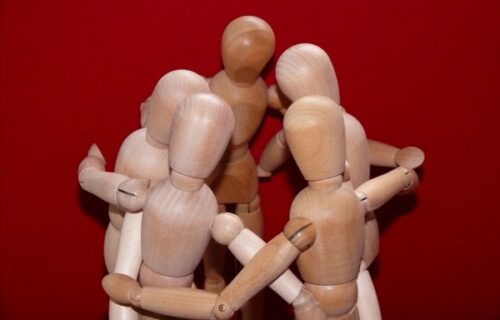
Stop Putting Emphasis on Self-Esteem

It’s lonely being the contrarian, but I disagree with most of the published and accepted works dealing with self-esteem. There are a lot of misconceptions about what self-esteem is, where it comes from, and how important it is. Everyone has a different theory about the root cause of self-esteem, the results of self-esteem, and what steps or skills need to be learned in order to raise self-esteem.
First, let’s be clear about what self-esteem is and what it is not.
Self-esteem is not a thing; it is not a chemical or hormonal imbalance that can be solved by nutrition, prescriptions, or physical therapy. Self-esteem cannot be improved through meditation, oral hygiene, or colon cleansing. Self-esteem is not some higher-power or astral plane that we should strive to achieve.
The word esteem means “to regard highly or favorably; regard with respect or admiration.” The statement “My esteemed colleague” refers to a colleague that you hold in high regard or for whom you have respect and admiration. We all know or have known people in our lives that we would consider esteemed. I’m certain there are just as many people that held your esteem until a point in time when they fell from grace, were not viewed quite as favorably or with quite the same level of admiration. At that time, you might have referred to them as being held in low-esteem. Therefore, the measure of esteem you have for a particular person is just that: a measurement of how positively or negatively you view that person. It can be a long-term measure or it can be a short-term, in the moment, measure that can change as often as necessary.
Self-esteem is the same measurement only applied to yourself rather than someone else. Self-esteem is a gauge of how positively you view yourself. Just like the esteem you afford a colleague, self-esteem can wax and wane depending on circumstances.
Psychologists identify two categories of self-esteem: Tacit self-esteem is a measure of how we generally feel about ourselves, on average. It’s a long-term look at how we feel about ourselves. On a gauge similar to the one on the left, tacit self-esteem would be a fairly steady measurement, the resting point on our gauge. Your self-esteem can change depending on a particular situation but generally speaking, if you ask people how they feel about themselves, they will respond in the positive.
Stage self-esteem is how we feel about ourselves right now, in a given moment or at a particular stage in our lives. Stage self-esteem can be lower or higher than our tacit self-esteem. It is not a fixed point; it is constantly adjusting based on our situation. When people confess that they suffer from low self-esteem, it is stage self-esteem that they are usually referring to.
Dr. Mark Leary, Professor of Psychology and Neuroscience and Director of the Social Psychology Program at Duke University, posits his sociometer theory (1) that self-esteem is a gauge that helps us monitor our environment and maintain our social status within a group and to warn us if we are in danger of being excluded from a social group. In early humans, exclusion from a group could mean death. Our brains are wired for sensitivity to exclusion from our social groups (family, friends, or colleagues) and our internal self-esteem gauge warns us when we are treading thin ice. For example, if your behavior leads to being ignored or ridiculed by the social group, you may feel bad or upset, i.e. low self-esteem.
So, if self-esteem is just a measurement or gauge of how we are feeling about ourselves, trying to improve self-esteem doesn’t really make much sense. Dr. Leary says that trying to fix self-esteem would be like taking a screwdriver to the gas gauge of your car and trying to change the reading on the gauge. The gauge isn’t the problem; it’s what’s causing the gauge to be low that really matters.
There are a lot of articles that tie self-esteem to self-confidence, but they are not the same. Self-confidence deals with how sure you are, how confident and competent you are, with your knowledge, skills, and attributes. You can be very self-confident in your abilities at work or on the golf course yet still have low self-esteem because you don’t feel you measure up in some way. How many times have we heard stories about high-powered executives that are wildly successful but still have self-esteem problems? Self-esteem and self-confidence are not the same.
So the question becomes, where does self-esteem come from? As the name implies, it comes from self. Self-esteem is your measurement or gauge of how positively you view yourself, how closely you come to meeting your own expectations, and how you measure up to your potential of the type of person you want to be. It is ultimately your measuring stick, regardless of what is happening around you. Your self-esteem is not determined by what someone else thinks, it is not determined by what someone else does, it comes from you and what you think of yourself. It may be influenced by external forces but you have control over your measuring stick and whether or how that external force impacts your self-esteem.
Another misconception about low self-esteem is that it somehow causes bad behavior. You will read articles that claim that low self-esteem causes students to get bad grades or that low self-esteem causes someone to experiment with drugs, abuse alcohol, or causes teenage pregnancy. While an easy scapegoat, self-esteem doesn’t result in destructive behavior; we engage in destructive behaviors and then, because we feel that we have let ourselves down or our family, friends, or colleagues down, our self-esteem drops. In that moment, we don’t measure up to our expectations or our potential and therefore our self-esteem plummets. Again, not forever or in all areas but in that area, we don’t measure up.
Some studies have shown that high self-esteem can be more detrimental in some cases than low self-esteem. Roy Baumeister, psychologist and Florida State University professor, found that contrary to previous belief, low self-esteem does not cause teens to engage in earlier sexual activity (2). In fact, those with high self-esteem were found to be less inhibited and more likely to be sexually active. On the topic of aggressive and violent behavior, Baumeister found that perpetrators typically hold a more favorable, and possibly even inflated, view of themselves. Consider the gang member or street thug that has such high self-esteem or self-love to be almost narcissistic, putting them above the law.
The fact is that low self-esteem doesn’t cause the behaviors; the behaviors cause low self-esteem. Which brings us the answer to our question: How do you raise self-esteem? Well, if negative behaviors lower self-esteem, it makes sense that positive behaviors can raise self-esteem. Since self-esteem is a gauge or measurement for how positively we feel about ourselves, doing something that meets or exceeds our expectations of ourselves will increase our self-esteem. Another concept that is gaining support and a topic Dr. Leary has written extensively about is self-compassion (3). We are often too hard on ourselves. Where we will easily give others grace when they err or leeway when it comes to attempting something difficult for the first time, we often don’t afford ourselves that same courtesy. We come down harder on ourselves when we don’t achieve our goal. We ridicule ourselves and badger ourselves with negative self-talk which leads to lower self-esteem. If people could learn to be gentler, more forgiving and compassionate with themselves, the topic of low self-esteem would never come up.
We as coaches should stop focusing on improving self-esteem and focus on the root causes of low self-esteem. If a client’s tacit self-esteem is low – they generally feel negatively about themselves – then that client may need a counselor or therapist rather than a coach. If a client expresses low stage self-esteem, focus on the event that caused the negative feelings. Only by dealing with and mitigating the root causes can we hope to improve self-esteem and give people back their pride and self-confidence.
______________________
1. Leary, M. R., & Downs, D. L. (1995). “Interpersonal functions of the self-esteem motive.” In M. H. Kernis (Ed), Efficacy, Agency and Self-Esteem (pp. 123-144). New York: Plenum Press.
2. Self Esteem Doesn’t Make Better People of Us; Self-esteem is bad for you (and even worse for your kids). Published in Psychology Today on May 17, 2008 by Michael J. Formica, MS, MA, EdM in Enlightened Living http://tinyurl.com/pw5sodd
3. Self-Compassion May be More Important than Self-Esteem in Dealing With Negative Events, New Studies Show Published on the website PhysOrg, May 15, 2007. http://tinyurl.com/q8l9lup




Add A Comment